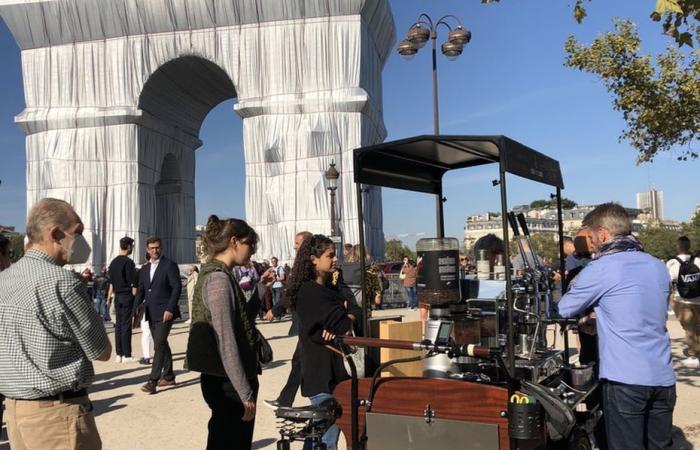
Crêpes, coffee, jams… Paris is full of nomadic sellers who go around the neighborhoods to sell their products. Legal traders who wish to make their sale without fear of fines and who refuse to be compared to street sellers.
The essentials of the day: our exclusive selection
Every day, our editorial team reserves the best regional news for you. A selection just for you, to stay in touch with your regions.
France Télévisions uses your email address to send you the newsletter “The essentials of the day: our exclusive selection”. You can unsubscribe at any time via the link at the bottom of this newsletter. Our privacy policy
Danilo Blanco has been selling coffees and breakfasts for 5 years as a street vendor in Paris. “We work legally and we want this to be recognized by the authorities“, he tells us. Although for several months, he has been having difficulty doing his job in good conditions.
The manager of the company TripBikeCafé blames the blow. He denounces the fact that his daily work is increasingly complicated in Paris. “We're in trouble with the police. We don't have a fixed location, so we are dependent on their willingness to let us do our work anywhere.”
And yet his trade is legal. It has a specific card for nomadic traders. “Knowing that we are nomads, we must constantly adapt to the regulations in force in the neighborhood in which we find ourselves.“, he says. He deplores that “legal traders are considered the same as street vendors by the police. We are the subject of increasing police distrust“An observation also made by Karine Guilley, itinerant coffee seller.”We are fined more and more often even though we are within our rights. “, she notes.
Today, the manager of TripBikeCafé claims that his company is “on the verge of filing for bankruptcy. “The concept of his business: offering breakfasts with authentic coffee machines located behind a bicycle.
“We launched this in 2019 and it worked well during the COVID period where we distributed breakfasts for caregivers in particular..”
The Trip Bike Café offered breakfasts to caregivers during the health crisis.
•
© Danilo Bianco
“We employ many young people who rely on us to pay for their studies, so filing for bankruptcy would have serious consequences.“. The manager fears that the “current regulations force legal businesses to go out of business even though they make a significant contribution to the economy and society”.
It notably implicates the Paris town hall and the Paris police headquarters. He believes that “recent decisions“of these authorities aim to”prohibit all nomadic trading activities, whether legal or illegal.”
For her part, Karine Guilley asks the Paris town hall and the police headquarters “clear regulations, even if it means paying so that we can do our job correctly without being harassed.”
When requested, the police headquarters ensures that the regulation of itinerant businesses “does not notice” of its field of action.
In Paris and Île-de-France, so-called “non-sedentary” are regulated by the Paris-Île-de-France Chamber of Commerce and Industry (CCI). On its website, it indicates that street vendors must be provided with a “flying card for mobile locations “in order to legally carry out their activity in the capital.”Very often, the merchant occupies a location belonging to the municipality. He must therefore first request authorization from the prefecture or town hall.“, specifies the CCI.
On this subject, the Paris town hall tells France 3 Paris Île-de-France that there has been “no recent developments in the regulation of street trading activities in the capital.” The Parisian executive indicates that the locations that can accommodate commercial activity on public roads are set by the City of Paris. The municipality also reminds that to obtain an authorization for temporary occupation of the public domain, “the response time from the competent City services is 2 months maximum“.





